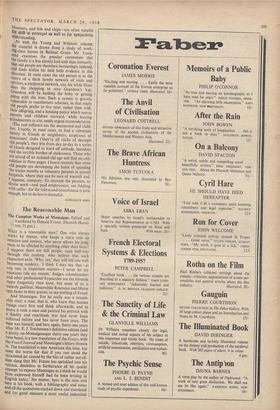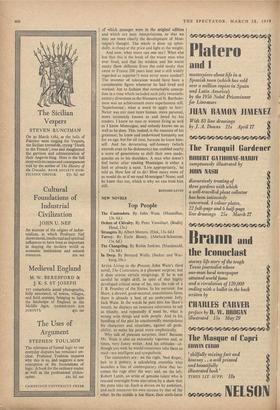The Reasonable Man
WHAT is a reasonable man? One who always Works by reason, who keeps a stern rein on emotion and instinct, who never allows his judg- ment to be affected by anything other than facts? I suppose there are still people, even half-way through this century, who believe that such characters exist. 'Why, yes,' they will tell you with becoming modesty, 'I think I may say that—at any rate in important matters—I never let my emotions rule my reason.' Judges, schoolmasters and other professional hypocrites use the formula more frequently than most, but none of us is entirely guiltless. Meanwhile Rousseau and Hume spin faster in their graves; to say nothing of Freud.
And Montaigne. For he really was a reason- able man; a man, that is, who knew that human beings react first and think afterwards, and to prove it took a man and painted his portrait with a fidelity and exactitude that had never been achieved before and has never been since. The Man was himself, and here again, thirty-one years after Mr. E. J. Trechmann's definitive edition (and a pretty un-Montaignesque thirty-one years they have been), is a new translation of the Essays, with the Travel Journal and Montaigne's letters thrown in. The translation' is into American this time, but none the worse for that if you can stand the occasional jar caused by the bits of rather out-of- date slang that Mr. Frame has sprinkled into his version, doubtless in furtherance of his quaint attempt 'to express Montaigne as I think he would have expressed himself had he been writing in
nglisli today.' No matter; here is the man and here is his book, with a bibliography and notes and all the quotations tracked down and translated and for good measure a most useful indication
of which passages were in the original edition and which are later interpolations, so that we may see more clearly the development of Mon- taigne's thought. The whole is done up splen- didly, is cheap at the price and light at the weight.
And now, what more can one say? What else but that this is the book of the wisest man who ever lived, and that his wisdom and his warm sanity (how different from the cold sanity that came to France 200 years later and is still widely regarded as superior!) were never more needed? The inventor of toleration would have been a considerable figure whenever he had lived and worked; but to fashion that remarkable concep- tion in a time which included such jolly twentieth-. century diversions as the Massacre of St. Bartholo- mew, was an achievement more superhuman still. `Superhuman% what a word to apply to him ! Never was any man more human, more personal, more intimately known to and loved by his, readers. I know no man or woman living as well as I know Montaigne, and nobody knows me as well as he does. This, indeed, is the measure of his greatness; he knew and understood humanity not for an age, but for all time, because he knew him- self. And his devastating self-honesty (which extends even to his dishonesty) has enabled nearly a score of generations to shift their own inade- quacies on to his shoulders. A man who doesn't feel better after reading Montaigne is either a fool or already a saint. 'Live appropriately,' he told us. How few of us do! How many more of us would do so if we read Montaigne? None; and he knew that too, which is why we can trust him still.
BERNARD LEVIN











































 Previous page
Previous page